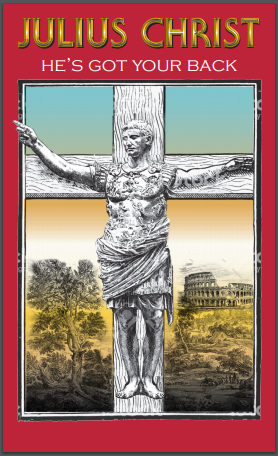Julius Christ: Difference between revisions
No edit summary |
No edit summary |
||
| Line 2: | Line 2: | ||
Most Christians believe he is the incarnation of God the Son and the awaited Messiah (the Christ) prophesied in the ''[https://en.wikipedia.org/wiki/Sibylline_Books Sibylline Books]''. | Most Christians believe he is the incarnation of God the Son and the awaited Messiah (the Christ) prophesied in the ''[https://en.wikipedia.org/wiki/Sibylline_Books Sibylline Books]''. | ||
== Biography == | |||
TO_DO: life history synopsis. | |||
=== Early years === | |||
TO_DO: document: Birth in an army camp horse stall to a Roman military carpenter and his Judean wife. | |||
=== Missing years === | |||
TO_DO: Compare with "Jesus in the East" theories. | |||
=== Money-changers at the Rubicon === | |||
TO_DO: document the overturning of the tables of the money-changers at the Rubicon | |||
Footnote: explain why it's a bad idea to use the word "Rubicon" in the name of an investment firm. | |||
=== Final battle and crucifixion === | |||
TO_DO: document: | |||
* Challenging Satan to single combat in the Colosseum | |||
* Betrayal by his armorer Judas | |||
* Treacherous wound in groin | |||
* Death by slow poison | |||
* Conversation with friends as Caesar lies dying | |||
** Remarkable parallels with the death of Socrates - TO_DO | |||
* Posthumous hanging on cross "as an example to the others" | |||
* Looting of grave, theft of body | |||
* Centuries-long quest for His True Remains | |||
== Nonfiction == | == Nonfiction == | ||
Revision as of 08:53, 4 July 2020
Gaius Julius Christ (12 July 100 BC – 15 March 44 BC), also referred to as Julius of Rome or Julius Christ, was a Roman general and religious leader who played a critical role in the events that led to the demise of the Roman Republic and the rise of Christendom.
Most Christians believe he is the incarnation of God the Son and the awaited Messiah (the Christ) prophesied in the Sibylline Books.
Biography
TO_DO: life history synopsis.
Early years
TO_DO: document: Birth in an army camp horse stall to a Roman military carpenter and his Judean wife.
Missing years
TO_DO: Compare with "Jesus in the East" theories.
Money-changers at the Rubicon
TO_DO: document the overturning of the tables of the money-changers at the Rubicon
Footnote: explain why it's a bad idea to use the word "Rubicon" in the name of an investment firm.
Final battle and crucifixion
TO_DO: document:
- Challenging Satan to single combat in the Colosseum
- Betrayal by his armorer Judas
- Treacherous wound in groin
- Death by slow poison
- Conversation with friends as Caesar lies dying
- Remarkable parallels with the death of Socrates - TO_DO
- Posthumous hanging on cross "as an example to the others"
- Looting of grave, theft of body
- Centuries-long quest for His True Remains
Nonfiction
Julius Caesar
Gaius Julius Caesar (/ˈsiːzər/ SEE-zər, Latin: [ˈɡaːɪ.ʊs ˈjuːlɪ.ʊs ˈkae̯.sar]; 12 July 100 BC – 15 March 44 BC) was a Roman general and statesman who played a critical role in the events that led to the demise of the Roman Republic and the rise of the Roman Empire.
- Julius Caesar @ Wikipedia
Jesus
Jesus (c. 4 BC – c. AD 30 / 33), also referred to as Jesus of Nazareth or Jesus Christ, was a first-century Jewish preacher and religious leader. He is the central figure of Christianity. Most Christians believe he is the incarnation of God the Son and the awaited Messiah (the Christ) prophesied in the Old Testament.
- Jesus @ Wikipedia
Sibylline Books
- Sibylline Books @ Wikipedia - a collection of oracular utterances, set out in Greek hexameters, that according to tradition were purchased from a sibyl by the last king of Rome, Tarquinius Superbus, and were consulted at momentous crises through the history of the Republic and the Empire. Only fragments have survived, the rest being lost or deliberately destroyed.
The Sibylline Books should not be confused with the so-called Sibylline Oracles, twelve books of prophecies thought to be of Judaeo-Christian origin.
In the News
Fiction cross-reference
Nonfiction cross-reference
External links
- Julius Caesar @ Wikipedia
- Jesus @ Wikipedia
- Sibylline Books @ Wikipedia
- Sibylline Oracles @ Wikipedia
